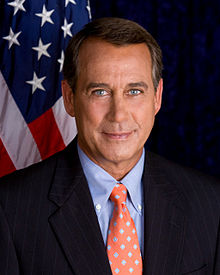 U.S. Rep. John Boehner, speaker of the House of Representatives, received nearly twice as much financial support from donors tied to the energy sector than did the next-closest recipient, a report from the National Wildlife Federation finds. The 20-page report highlights the role it says oil companies play in U.S. politics, stating energy companies are working behind the scenes on Capitol Hill to influence legislation in favour of oil, natural gas and coal policies. The NWF report finds that the current 112th U.S. Congress has voted one out of every five times against legislation drafted in favour of environmental issues.
U.S. Rep. John Boehner, speaker of the House of Representatives, received nearly twice as much financial support from donors tied to the energy sector than did the next-closest recipient, a report from the National Wildlife Federation finds. The 20-page report highlights the role it says oil companies play in U.S. politics, stating energy companies are working behind the scenes on Capitol Hill to influence legislation in favour of oil, natural gas and coal policies. The NWF report finds that the current 112th U.S. Congress has voted one out of every five times against legislation drafted in favour of environmental issues.
Big Oil Funding U.S. Politics
Members of Congress Who Reauthorized Warrantless Wiretapping Bill Don't Understand What It Does
 Congress doesn't really understand what it's doing.
Congress doesn't really understand what it's doing.
Specifically, the House members who voted 301-118 on Wednesday to reauthorize the vast spying powers in the Foreign Intelligence Surveillance Act Amendments Act (or FISA Amendments Act, and yes, that's really its name) don't seem to understand what they were doing.
The same thing happened in 2008, when Congress first voted to retroactively legalize warrantless wiretapping. Then, as now, supporters of the legislation falsely insisted that it does not collect the communications of American citizens.
Congress Now Trying To Outlaw Reporting On Government Corruption
 Lawmakers are pushing legislation through Congress that will criminalize reporting on illegal activities and corruption in the US government.
Lawmakers are pushing legislation through Congress that will criminalize reporting on illegal activities and corruption in the US government.
What makes this new legislation shocking is that we have seen the US government repeatedly use the “State Secrets” and the “National InSecurity card to suspend the Constitution at will to commit a wide variety of heinous activities from torture and indefinite detention without trial to outright forced drugging of prisoners and even repeated assassination by the government, of people including US citizens, which is now being done on the direction of the United States’ first even assassination czar.
FBI probed GOP trip with drinking, nudity in Israel
 The FBI probed a late-night swim in the Sea of Galilee that involved drinking, numerous GOP freshmen lawmakers, top leadership staff — and one nude member of Congress, according to more than a dozen sources, including eyewitnesses.
The FBI probed a late-night swim in the Sea of Galilee that involved drinking, numerous GOP freshmen lawmakers, top leadership staff — and one nude member of Congress, according to more than a dozen sources, including eyewitnesses.
During a fact-finding congressional trip to the Holy Land last summer, Rep. Kevin Yoder (R-Kan.) took off his clothes and jumped into the sea, joining a number of members, their families and GOP staff during a night out in Israel, the sources told POLITICO. Other participants, including the daughter of another congressman, swam fully clothed, while some lawmakers partially disrobed. More than 20 people took part in the late-night dip in the sea, according to sources who were participants in the trip.
Congress Now Trying To Outlaw Reporting On Government Corruption
 Lawmakers are pushing legislation through Congress that will criminalize reporting on illegal activities and corruption in the US government.
Lawmakers are pushing legislation through Congress that will criminalize reporting on illegal activities and corruption in the US government.
Just when you thought the United States government couldn’t sink any lower our beloved politicians in Washington have introduced legislation that will criminalize reporting on US government secrets.
Members Who Supported Massive Giveaway To Big Oil Have Received $38.6 Million from the Industry
 The House of Representatives, which already holds the title of the most anti-environment House ever, today added another mark to the list — the Domestic Energy Production Act, H.R. 4480.
The House of Representatives, which already holds the title of the most anti-environment House ever, today added another mark to the list — the Domestic Energy Production Act, H.R. 4480.
The act is specifically designed to increase oil and gas development, with measures that block safeguards from smog and pollution and mandate drilling on public lands. The House Republicans passed this pollution and plunder energy package overrun by oil and gas industry interests, 248 to 163. This breakdown includes 229 Republicans and 19 Democratic members.
Senate defeats proposal to trim food stamp program

The farm bill, one of the last major pieces of legislation that could clear Congress before the election, carries out major changes to the federal safety net for farmers, replacing their direct payments, even when they don't plant crops, with greater emphasis on crop insurance and a new program to protect farmers from revenue losses.
More Articles...
- GSA bonuses, travel expenses raise congressional ire
- Freedom watch: Not a single Democrat voted in favor of ending FDA raids on raw milk farmers
- Senate Banking Chair Calls Jamie Dimon to Testify: But JP Morgan Chase is His Biggest Contributor!
- US House Stealthily Passes Extreme Pro-Israel Legislation
Page 25 of 57

 Congressional Glance
Congressional Glance






























